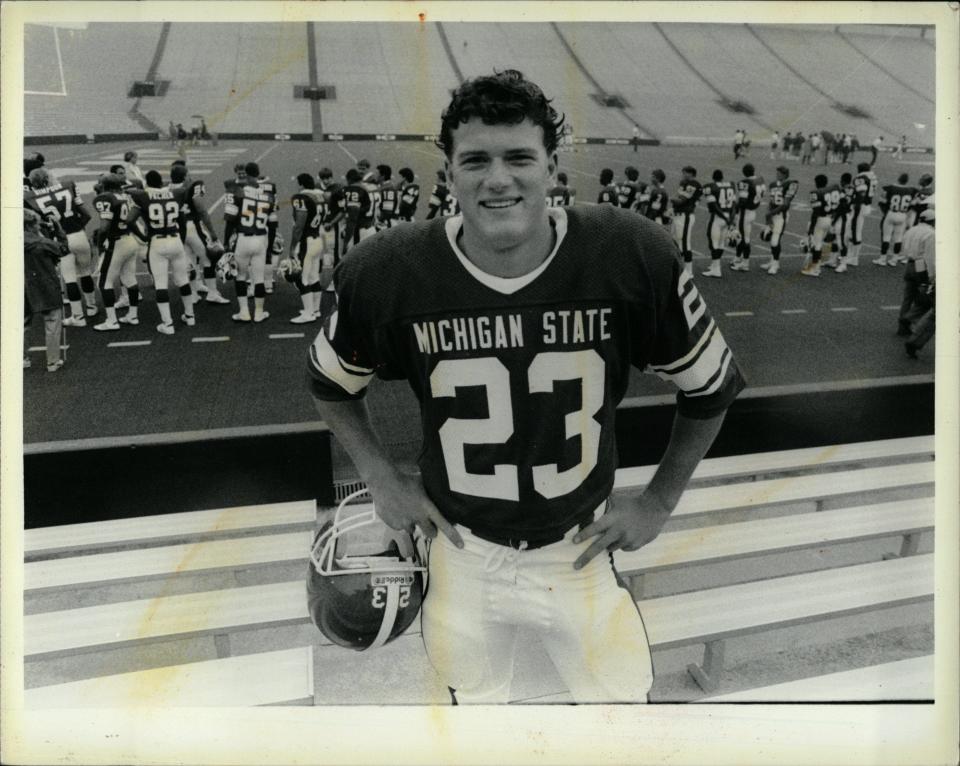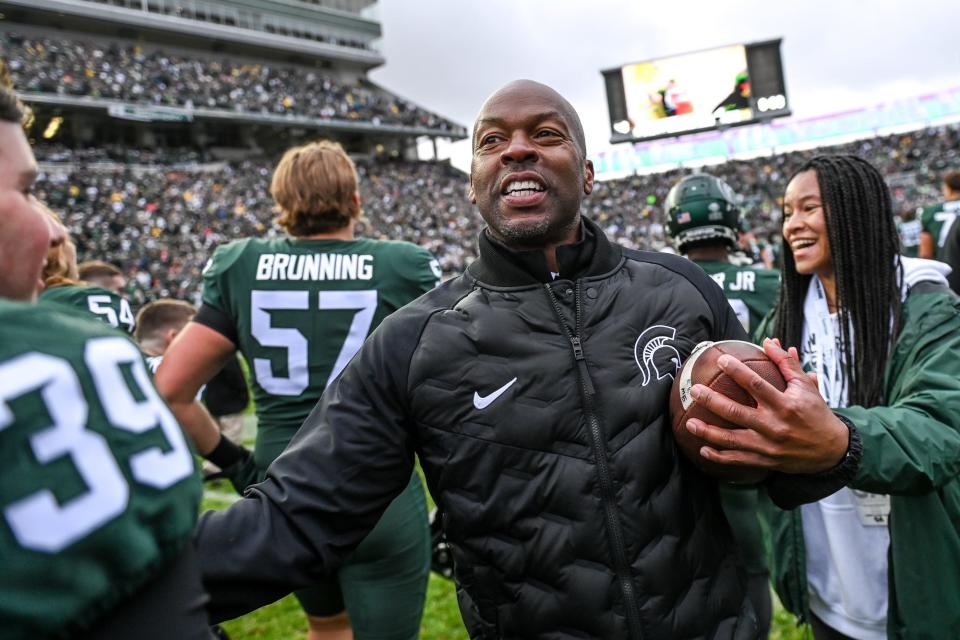'It means a lot': Michigan State placing mental health of student-athletes at forefront
EAST LANSING – Returning to Michigan State earlier this year was an opportunity Ashton Henderson couldn't turn down. Yes, the chance to work for his alma mater was part of the reason for his excitement. But there was a specific aspect of his role — he's MSU's executive associate athletics director for championship resources — that attracted him most.
He would be the chief proponent for the mental health of student-athletes.
Mental health is a cause that motivates Henderson every day.
A four-year letterwinner for MSU's football team from 2006 to 2009, Henderson has family members who have battled mental health challenges. And he's seen the way it's affected others who once played for MSU.
"Seeing and being around former Spartans and teammates who are still struggling with mental health barriers in their lives?" Henderson said. "Those are things I didn't necessarily know about."
He's not having to go it alone.
Michigan State created two full-time positions solely devoted to the endeavor: Molly McQueary and Jeff Williams both hold the title of director of student-athlete wellness. Williams is a licensed clinical social worker; McQueary focuses on mental performance.
A Michigan native, Williams was thrilled to come back to his home state in the new role.
"It means a lot," he said. "It just shows that (MSU athletics director) Alan Haller and the administration are putting action to their words. As our athletics director, one of the first thing Haller said that he would do was start a mental health program — and he came through on that. So it means a lot to me, being a mental health provider, seeing that we're able to provide support where it's needed."
MORE: Michigan State football at Maryland: 5 determining factors and a prediction
FROM LSJ COLUMNIST GRAHAM COUCH: How MSU football got here, when it might improve, and when it's fair to expect Mel Tucker's program to thrive
LISTEN: Spartan Speak: Michigan State finds itself an underdog against Maryland
Williams, who started Aug. 1, sees athletes "for a range of things," from stress to potentially a more serious diagnosis.
"It could be stress dealing with academics, stress dealing with performance within their sport or even within their family dynamics," he said. "Or if there have been issues they've had in their childhood that could be impacting their ability as a student-athlete, they can come and see me and be able to work on those things."
McQueary's position, dedicated to mental performance, also covers the spectrum of emotions a student-athlete might face in college.
"That job helps them with positive self talk, how to give coaches and equip them with education with speaking to a Gen Z student-athlete as opposed to coaching someone who's Gen X or Gen Y — those types of different challenges that are there," Henderson said. "Ultimately, it's helping you maximize your optimal performance. Like the things you should think about: What are your routines? How's your sleep hygiene? What's your family history? Are you anxious about those something? It's trying to help you navigate those things."
Compared to their predecessors, members of Gen Z — those born between 1995 and 2010 — feel more comfortable openly speaking about their mental health. Which comes as a relief to Williams. And also makes his day-to-day job easier.
"As a society, I think we've moved to a better place, where we've been breaking the negative stigma," he said. "A lot of people have been speaking out and speaking up about their mental health, and the benefits from getting help. The younger generation, they're open to talking. There are some cases where it may be a struggle for them to ever come in and accept that they may need to talk to somebody. But overall, I would say that this generation is in a much better place. They're more open to utilizing mental health services."

PROBLEMS: Michigan State football: Early-game offensive stumbles compound defensive woes
FOR SUBSCRIBERS: Inside the players-only defensive meeting after Michigan State's loss to Minnesota
Those words bring joy to Margot Moran. Her older brother, Greg Montgomery, died by suicide two years ago. An All-American punter during his time at MSU in the 1980s, Montgomery championed the importance of mental health for years prior to his death.
That his alma mater now places such an emphasis on it, his sister said, would make him proud.
"I think this is important for parents to watch, because kids these days tend to be able to ask for help or talk about their mental condition," Moran said. "Adults sometimes need reminding that this is very serious and we need to talk about these things. I am just thrilled kids feel better about being able to ask for help and check in about their mental health. While there are a lot who do, there are still a lot who don't. There's still so much more work to be done."
Henderson wishes these services were more readily available when he still was in college.
"I was always taught to be mentally tough, you know? Don't ever show signs of weakness, not only in sports, but at home," he said. "So when there were moments I wanted to cry or let out that emotion, I couldn't. I just didn't feel that was the appropriate thing, because that's not what I had been told.
"So I do feel with student-athletes in this day and age, having family members who are schizophrenic, who are bipolar, who deal with these challenges and mental illnesses every day, how we can best learn and support them is very important."

CLOSER THAN YOU THINK? Scottie Hazelton: Michigan State football defense not 'super far away'
UPON FURTHER REVIEW: What Mel Tucker is emphasizing after watching Michigan State football game film
MSU isn't keeping the message in-house, either. In its last game, the football team wore helmet stickers highlighting the organization named in Montgomery's honor; its opponent, Minnesota, did the same. This week, the Spartans will join in another mental health initiative in their contest at Maryland. It's the Terrapins' "Mental Health Awareness Game." Both MSU and Maryland will sport green ribbons on their helmets, as green is the color of mental health awareness.
"Maryland asked us to participate, and we graciously accepted," Henderson said. " You're seeing more of these organic mental health initiatives throughout the (Big Ten) conference. And they're not just about putting on decals, but they actually have a call to action, which I appreciate."
There's a nutritional component to all this, too.
Previously, student-athletes had a station at Jenison Field House where they could grab snacks on the go. Now, every team has a nutritionist specific to their sport.
"Football players eat differently than men's golfers. It's just the nature of it," Haller said. "What I saw over the last couple of years is that nutrition helps performance."
Tailoring diets to each sport, Haller said, is the least his department can do.
"It's a bare minimum of equity," he said. "Our student-athletes should all be able to eat the same — not the same food, but 'eat the same' as it relates to fueling them in their sport."
Henderson said this is just the beginning. Going forward, MSU's athletic department will continue to identify and devote resources to better the health of student-athletes, on and off the field. In the next three to five years, Henderson expects there will be far more than just Williams and McQueary working in the department.
He wants a whole division committed strictly to mental health and wellness.
"I'll ask for the moon, and I'll continue to ask for it, because it's important," he said. "Right now, when you think about it, we have two full-time positions. Can we go from two to five? And from five to seven? And then, we'll go from there."
Contact Ryan Black at rblack@lsj.com. Follow him on Twitter @RyanABlack.
This article originally appeared on Lansing State Journal: MSU athletics: Spartans emphasizing student-athlete mental health

